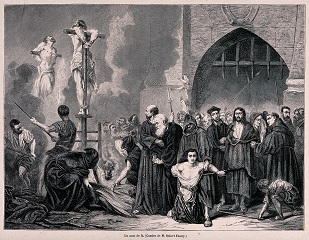
Word of the Day: Querulous
Paul Schleifer
Querulous is an adjective that can mean two different but very similar things. First, about a person, it can mean “full of complaints” or “complaining.” But it can also mean “characterized by or uttered in complaint” when it concerns someone’s tone of voice.
The word enters the language around the year 1400 “from Old French querelos ‘quarrelsome, argumentative’ and directly from Late Latin querulosus, from Latin querulus ‘full of complaints, complaining,’ from queri ‘to complain,’” according to www.etymonline.com. The Latin queri is also the origin of the English word quarrel, which came into English from Old French about 50 years or so before querulous.
On this date in 1492, the Catholic Monarchs of Spain, Queen Isabella I of Castile and King Ferdinand II of Aragon, issued the Alhambra Decree. These monarchs are, of course, the famous pair whose marriage marks the beginning of the unification of Spain; and to Americans, their most famous act was the Capitulations of Santa Fe, signed on April 17, 1492, the agreement which funded and authorized the Genoese explorer Christopher Columbus to sail west and claim lands for Spain. But before I explain the Alhambra Decree, let me provide a little background.
The Umayyad Caliphate had conquered much of the Iberian Peninsula by the year 711 CE. But in either 718 or 722, the Christian kingdoms scored a victory over the Muslims at the Battle of Covadonga. That is the beginning of the Reconquest of Spain, a process which took around 770 years. The last bit of the Iberian Peninsula under Muslim control was the Kingdom of Granada.
In Granada, as in all of the Muslim world during the Middle Ages, Jews were protected from persecution because they were considered “people of the Book.” This meant that they were able to trade and prosper, and Jews were contributors to the culture that existed in the Muslim world during the period. On the other hand, Jews were at best tolerated in Christian kingdoms, and at times they were openly persecuted. Jews were expelled from England and Wales in 1290, from France in 1182, 1306, 1321, and 1394, from Austria in 1421, from Provence in 1430, from Hungary in 1349 and 1360, from Silesia in 1159 and 1494, from various German states in 1348, 1510, and 1551, from Sardinia and Sicily in 1492, from the Papal States in 1569 and 1593, from Lithuania in 1445 and 1495, and from the Crimea in 1016 and 1350. The length of these expulsions obviously varied; for instance, the Jews were not allowed officially back into England until the 1650s, during the Interregnum.
The Alhambra Decree gave the Jews who remained in the Kingdom of Granada four months to either leave Spain or convert to Christianity. Jews caught after that four-month period faced execution. Leaving was somewhat problematic for the Jews because they were not allowed to take gold, silver, or coinage with them, and the market for their real and personal property, the stuff they could not carry, was very much depressed during the period because so many of them were trying to sell their stuff. So much of the wealth of these Jews remained in Spain after their departure.
For those who converted, life was not much better because the Christians, somewhat correctly, I suppose, did not believe that the conversions were sincere (who would?). Jewish converts to Christianity may have numbered 300,000 or more. But even after conversion they were suspected by the Spanish Inquisition, and any caught engaging in Jewish practices were executed.
A lot of people seem to think that the Holocaust was a special moment in the history of anti-Semitism, a madness created by Adolph Hitler and executed by the Nazi Party and by the German people. But the reality is that anti-Semitism has existed in Europe for a millennium, at least. Indeed, anti-Semitism in Europe continues to this day.
And if one thinks the Jews tend to be querulous, perhaps they have a right to be.
The image: I think it explains itself.